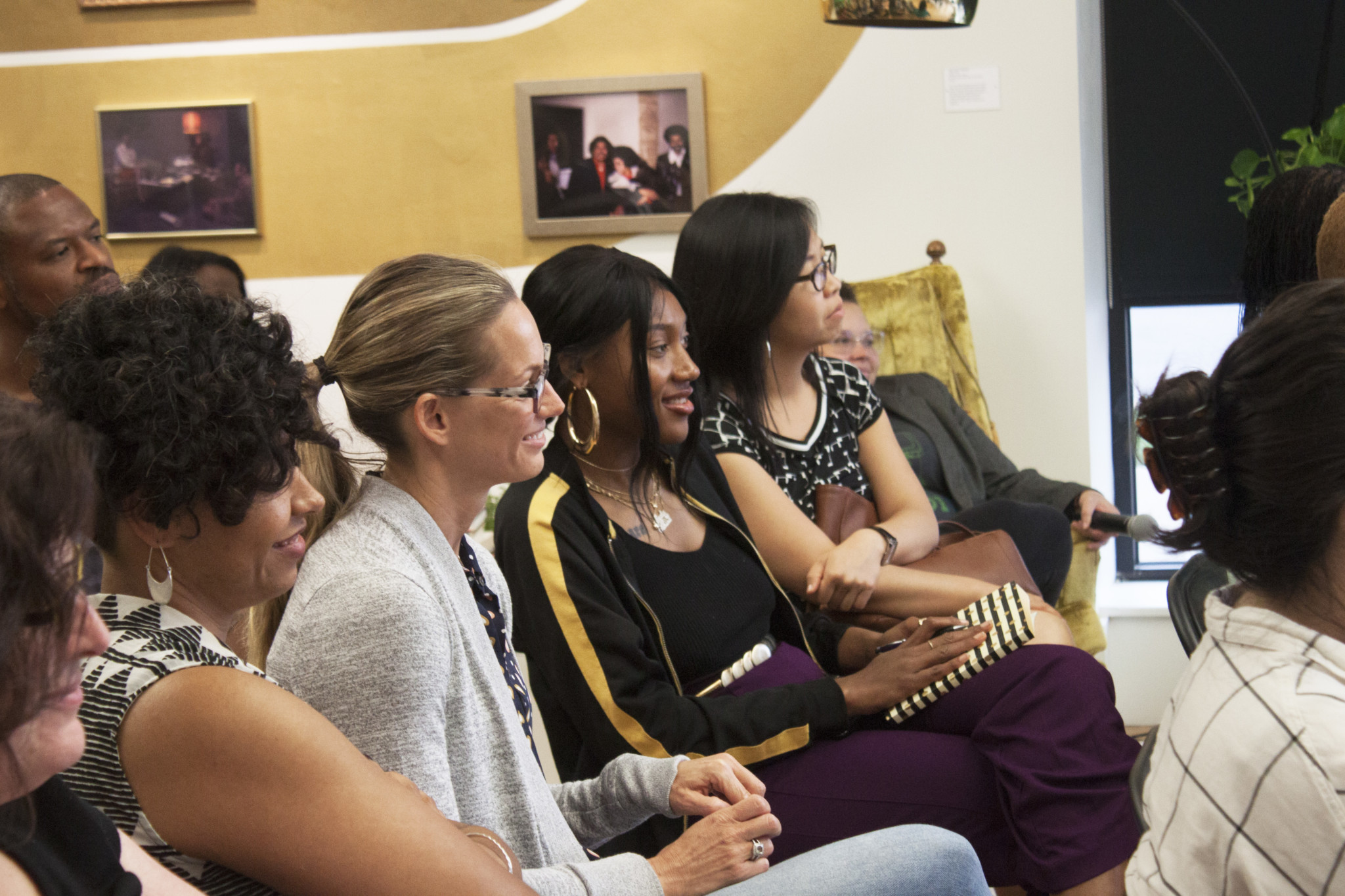The home movie clip shown at the beginning of “South Side Sisterhood” was simple. A toddler waddled around in a diaper; his siblings smiled and made faces at the camera. The trio were doing what many siblings do: simply being together.
This simplicity and intimacy carried on throughout “South Side Sisterhood,” which explored sibling relationships and childhood on the South Side but at times felt like a community confessional. The event, which took place at the University of Chicago’s Arts Incubator in Washington Park last month, was part of “Everyday Resistance: The Art of Living in Black Chicago,” a recently-closed exhibit by the South Side Home Movie Project that explored multiple facets of South Side life through the lens of archived home videos. While clips from the project’s archives continuously played in the gallery, sisters Miriam, Audrey, and Jill Petty took the stage, laughing and joking among themselves all the while. Like “Kevin, Sheena, Carl, in the Bedroom” did, the sisters gave their audience a peek into their lives as siblings and an opening for a broader celebration of South Side life.
The trio took questions from the audience and University of Chicago professor of cinema and media studies Jacqueline Stewart, who also serves as the director of the South Side Home Movie Project, an initiative that seeks to gather and restore home movies from residents of Chicago’s South Side. Touching on themes of sisterhood, gender and youth, the sisters conducted what was described as a meditation on gender and youth culture as it relates to growing up on the South Side. Each sister in turn answered questions about their upbringing and how, after relocating, they found themselves moving back to Chicago.
Miriam Petty, an associate radio, TV, and film professor at Northwestern University’s School of Communication, described the sisters’ childhood relationship. “There was just a kind of federation between the three of us. There was just a kind of sisterhood that was very clear, that had everything to do with having each other’s back,” she said. “I think we helped each other make sense of the world.”
The sisters talked about what it was like to grow up as women in Chicago, and how their gender shaped their childhood and interests. Audrey Petty, a writer and educator known for her work as the editor of High Rise Stories: Voices from Chicago Public Housing, discussed how they pursued their own pastimes, regardless of gender, saying, “We just did.” She explained how their sense of sisterhood gave way to learning about feminism. “We talked about women’s lib, we talked about [the Equal Rights Amendment],” she said.
At many points in the evening, the audience nodded along as the trio recalled relatable experiences in their childhood, such as dealing with bullies and “coming home when the lights came on.” They also talked about their hopes for their own children.
“We all have only children,” said Jill Petty, an editor at Northwestern University Press. “So I think one of the things that we looked forward to when we moved back here, is to make sure that our kids would all know each other and hopefully develop some of the same kind of closeness and understanding.”
The room was full of people who might have never met before, but the sense of closeness that Jill described could be felt once the audience asked its own questions. When one audience member asked how to get family members to understand how their mistreatment affects them, other attendees chimed in to help, along with the sisters. After the Q&A, people gravitated toward each other with ease, continuing their conversations in small groups.
When a family invites you in, as the Petty sisters did, it is not hard to feel a sense of community afterwards. Sandra Swift, a resident of the South Side who attended, said at the end of the event that although the sisters and Swift were from different generations, she found and connected with the similarities of growing up as a Black child in Chicago. “Just because they may be older than me, I might have something to relate to them about,” Swift said. “Being from the South Side, it feels good to hear other people’s stories.”
This is what the event was all about: celebrating the everyday lives of people, specifically African-Americans on the South Side of Chicago, and providing a space to reflect on our own communities.
“We get together for the sake of getting together,” Jill said. “There’s some joy in it, there’s some community building in it, and it’s also just fun. That’s enough. That should be enough.”
Sarah Thomas is a contributor for the Weekly. Fresh from Milwaukee, Sarah spends most of her time in coffee shops with comic books, and her interests include the arts, social justice, climate change, and Black feminism. This her first article for the Weekly.



